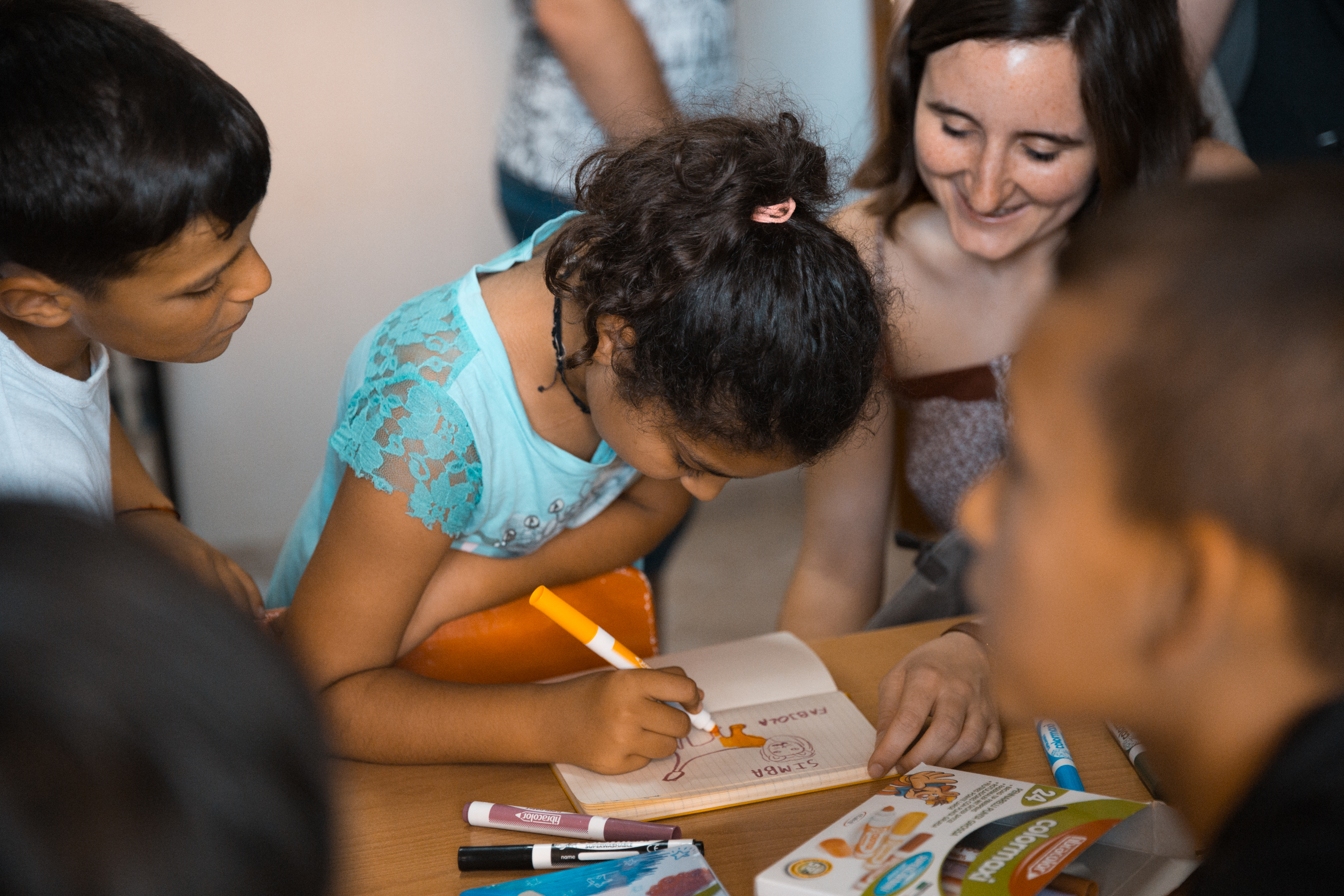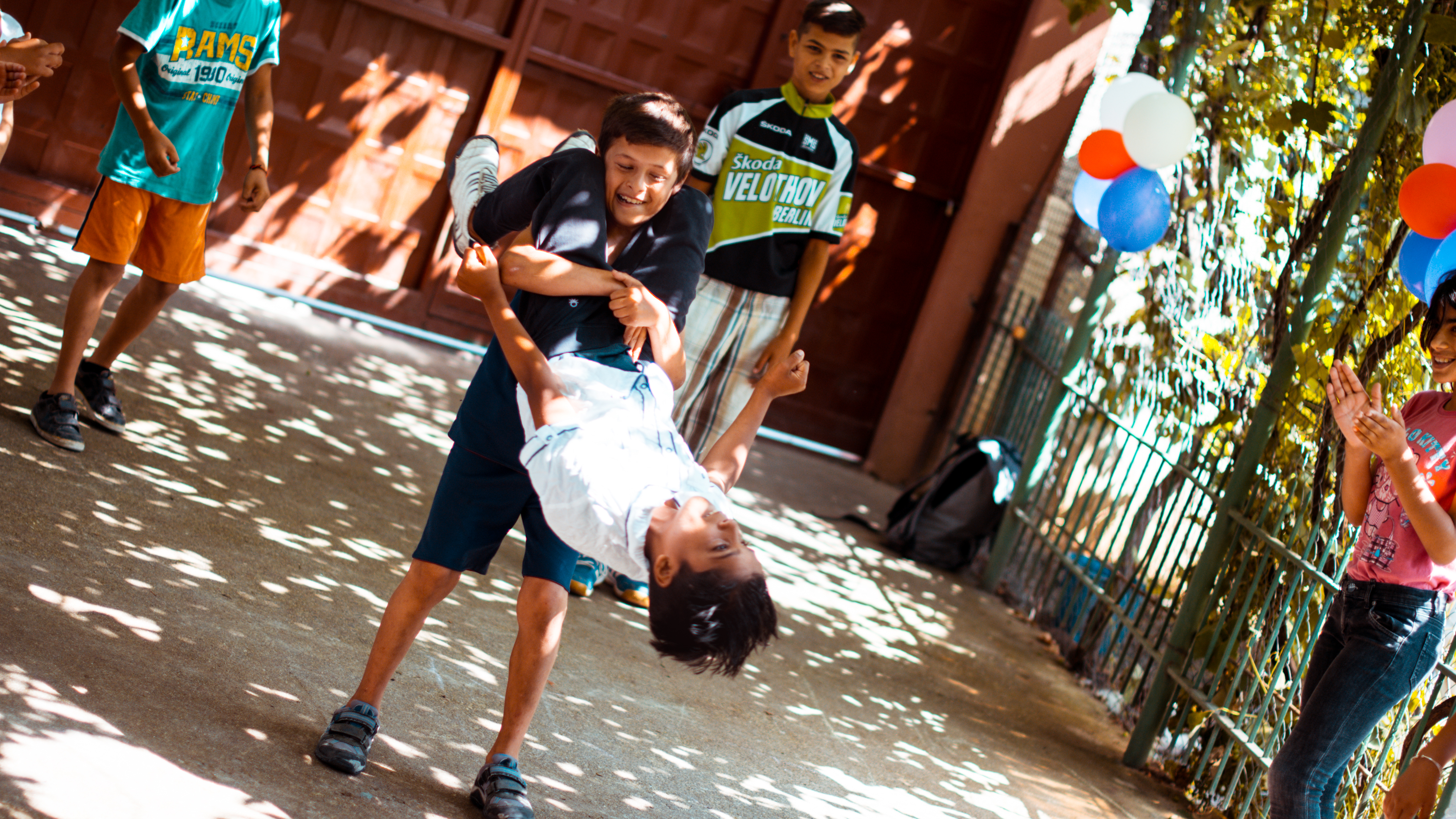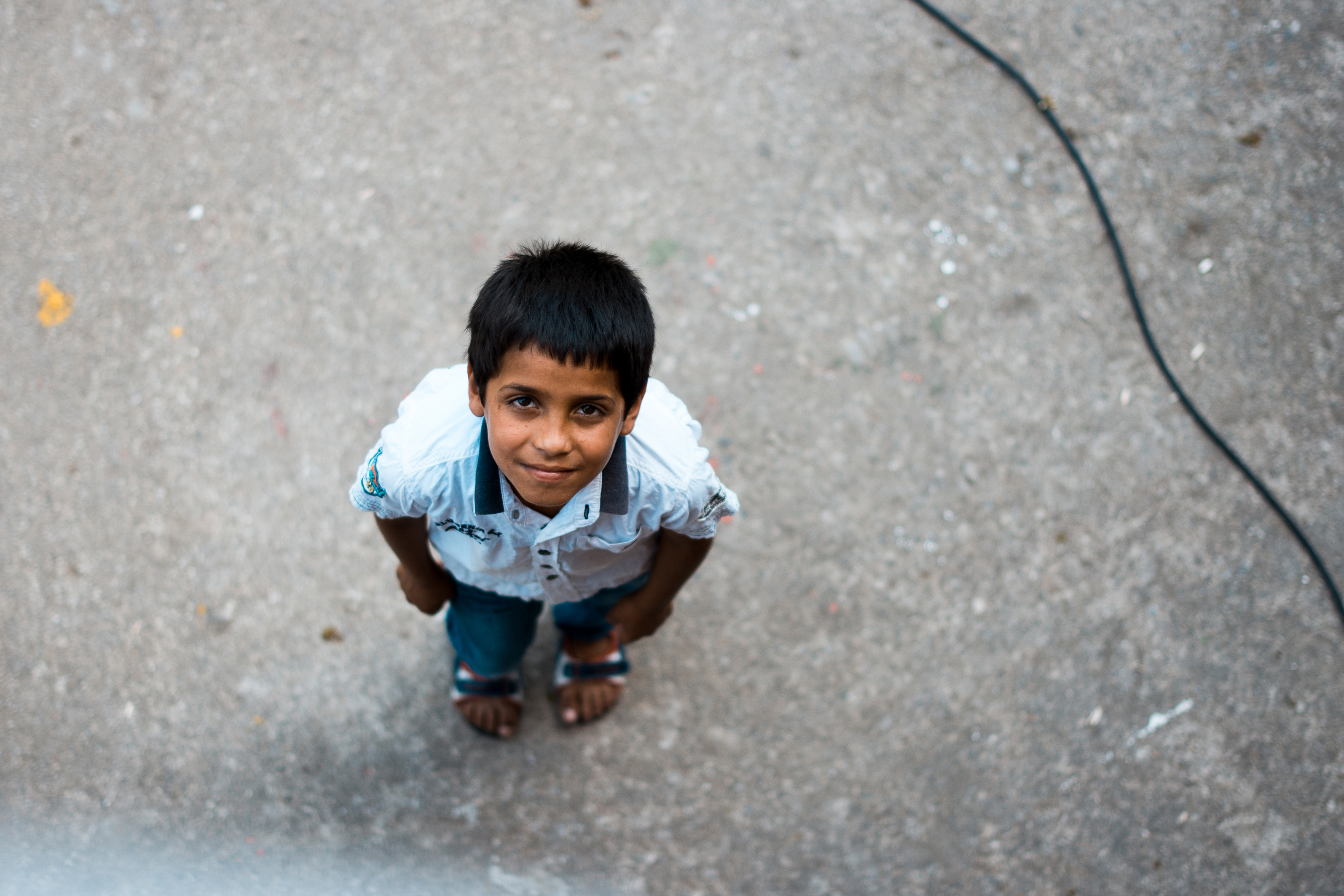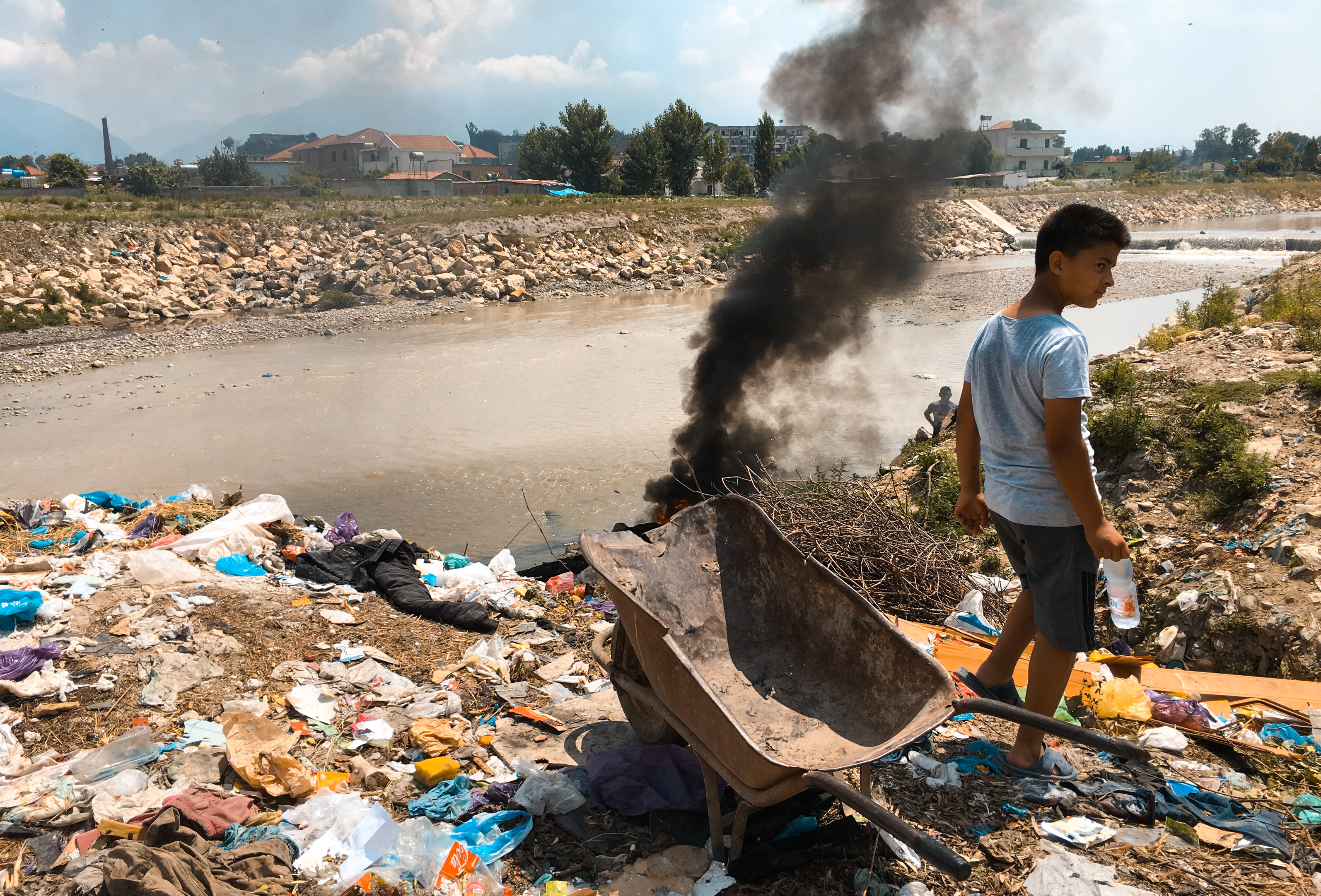Fabjola is a smart kid. She’s the best pupil in her class. Yet this ten-year-old will probably never attend a higher-education institution because she was born into a Romani family in Tirana’s poor area of Bregu i Lumit.
Ears pricked, four large paws and ochre-coloured fur – gradually the drawing is taking shape. The child’s hand carefully fills in the outlines while the other pupils attentively glance over her shoulder. “It’s strong and never gives up. I like that,” says ten-year-old Fabjola as she finishes painting the lion’s mane. She writes “SIMBA” in capital letters above the feline predator. Fabjola likes all animals, but lions are her favourite. She has learnt a lot about them in biology class.
“She’s a smart kid, and she wants to learn something new every day,” says her teacher, who has been working at Eden children’s centre since 2008. Located on the outskirts of Tirana in the heart of the Bregu i Lumit district, the institution helps children and young people with their studies. They get warm meals and have a place to play here too. Fabjola has been spending every afternoon from Monday to Friday at the centre for the past four years. In the mornings she attends public school. She could spend the afternoon at home, but there isn’t much for children to do in the area.

Biology and art are Fabjola’s favourite subjects. Photo: © Alina Neumann, Roman Wagner
Like most people in Bregu i Lumit, Fabjola belongs to the Romani community. She is one of the roughly 115,000 people from this ethnic group living in Albania today. This figure is based entirely on estimates, however, as only a few officially declare themselves to be Romani in censuses. Besides, it is unclear whether Albania’s Balkan-Egyptian community also belongs to this ethnic group. While the former feel independent from the Romani, politicians say otherwise. What both communities have in common, though, is the discrimination and disrespect they are shown by the rest of society. Many do not have valid documents and therefore settle in informal areas such as Bregu i Lumit. These neighbourhoods do not exist on the map, their streets have no names.
A forgotten place at the edge of town
Rather than a proper district, Bregu i Lumit – which translates to “riverbank” – is more of a spacious, scattered area that stretches along the Lana River. It’s a mere half-hour’s drive from downtown Tirana, but you feel like you are in another world. Children play amid household rubbish, carts drawn by donkeys serve as vehicles. Some 60,000 people live along the river, most of them in poor conditions. There is a shortage of work, medical care and, above all, prospects. Eden children’s centre aims to contribute to improving the situation and wants to be safe haven for the youngest residents. It is run by an NGO called SHKEJ. Founded in 2003 by a group of students, the organisation has focussed on supporting street children, women’s rights and families. SHKEJ provides people with the bare necessities – warm meals, medicine and clothing, for example – but it also helps individual families in need of specific support.
Getting financial assistance from outside is imperative, which becomes obvious when visiting Eden children’s centre. The two classrooms are equipped with only the most basic features. A few books sit in timeworn shelves. Toys are scarce. The wooden tables are old, and the chairs’ screws are loose. Colourful posters and drawings cover the cracks in the walls. Yet there is no shortage of crayons and paper. That’s probably because art and music are the favourite subjects of most of the children.
“In our neighbourhood, many women are still married off at a very young age – around 16.”
It’s no surprise then, that the centre’s tarmac courtyard frequently turns into a dance floor. Today –International Children’s Day – is no exception. The garden pergola is filled with music and laughter. If you close your eyes, you might think you are in downtown Tirana, where parades and celebrations are taking place in honour of its youngest residents. There hundreds of people stroll up and down the boulevard, crowding around stands to buy sweets and toys for their little ones. The girls and boys from the children’s centre, however, aren’t aware of any of this. They celebrate with their own little party.

The children dance underneath a pergola in the garden. Photo: © Alina Neumann, Roman Wagner
A boy in worn-out sneakers lifts the legs of his friend over his shoulders. Faster and faster he spins him around. The children have formed a circle around the two boys. Some scream in excitement, others applaud and cheer the boys on. They are enjoying just being children. Fabjola is here too. She has put aside her crayons for a while. She and a boy recite a poem. Then she dances through the garden holding hands with her best friend Adriana and her teacher. A young woman makes her way through the crowd. She climbs up the stairs and enters the centre’s office. A piece of paper is in her hand – a medical bill. Her family doesn’t have enough money to pay the bill. “Parents often ask us for help. If possible, we pay for medicine, visits to the doctor or eyeglasses,” Elvis Mancellari, one of the children’s centre’s three social workers, tells us later. This makes the centre the only institution in the area that not only helps pupils with their studies on a daily basis but provides financial support to their families.
Postcards from Albania
Postcards from Albania is a journalistic research project by students of Journalism and Public Relations at the FH Joanneum in Graz. In the early summer of 2018, the 19-member editorial team reported live from the ten-day research trip through the Western Balkans. erstestiftung.org shares selected articles from the comprehensive online and print magazine which resulted from the project and translates them into English.
There is hardly any political support. “The government solely focuses on businesses in the centre of Tirana. Here it’s much more difficult,” says Mancellari, who has been working for Eden children’s centre for two years. Erion Veliaj, the incumbent mayor of Tirana, visited once, he says. After that, there were pictures of Veliaj and the children in the newspapers. But they never received any subsidies. As a result, the institution is financed entirely through donations, provided by Austrian Caritas’s St Pölten office, for example. During the winter in particular, the centre is often stretched to its limits. The two-storey building houses two classrooms, which accommodate no more than 70 visitors – a fraction of all the children from Bregu i Lumit.
The children can attend Eden children’s centre until they are 18 years old. How they get on with their lives after that often remains uncertain. Nine out of ten Albanians graduate from secondary school. By contrast, only half of Romani children receive further education after primary school. “I want to be a football player,” yells Ramis across the classroom when asked what he wants to be when he grows up. Jobs such as firefighter, pilot, baker and teacher are among the top ambitions of the other boys. None of the girls answer. Fabjola doesn’t say anything either. “In our neighbourhood, many women are still married off at a very young age – around 16,” says their teacher, Greta Koxhajo Pjetri. For most of them, it goes without saying that they will spend their time at home in the kitchen rather than attending secondary school. But even for the boys, reality often differs from their expectations.
Between ashes and new beginnings
Black smoke rises from the side of the river. A boy has just lit a bonfire there. Piles of rotting clothing, discarded household appliances and plastic parts litter the riverbank – there’s rubbish as far as you can see. Wearing flip-flops, the boy climbs around in the debris and ashes. He and his father poke at blazing car parts. With the acrid smell of melting plastic, there is barely enough air to breathe. The boy is about twelve years old and has long gotten used to it. He spends every day at the riverbank. The burnt-out metal he gets from old cables and car parts earns him around 500 lek a day, which is not even four euros. It’s just enough for his family to survive.

When he grows up, Ramis wants to be a football player. Photo: © Alina Neumann, Roman Wagner
In most Romani families, the men are responsible for earning the household income. Since they lack quality education, they have to settle for poorly paid jobs. “Many make their living collecting returnable bottles,” explains Mancellari as he points to one of the huge bags filled with plastic that are stored in front of many shacks. He and two other social workers help some 40 families that live around the children’s centre to find employment. He visits them regularly and listens to their worries – like today. Mancellari knocks at one of the wooden doors. A young woman in her mid-twenties opens it. She greets Mancellari and invites him in. Even inside the dwellings, the poverty is visible everywhere. Large families live in small spaces of just a few square metres. This family of six has a single room, which serves as their kitchen, bedroom and living room. The bathroom consists of a washbowl in front of the shack. Water leaks through the roof into the house, the cold creeps in during winter. A single picture on the wall shows the young woman and her husband on their wedding day – both laughing. Today she is wearing the same earrings, her long hair pinned up loosely. But her smile is more subdued. Caries and rotten teeth are a huge problem here, Mancellari tells us later.

Instead of attending school, this boy spends his mornings in junk and ashes. Photo: © Alina Neumann, Roman Wagner
Not much has changed in Bregu i Lumit during the ten years since Eden children’s centre was established. The area is still plagued by poverty and poor healthcare. While people living around Skanderbeg Square stroll around with Michael Kors bags, Bregu i Lumit lacks the most basic essentials – toothbrushes, for example. The fact that most elderly residents cannot read and write further exacerbates development and educational work. In contrast to Western countries, here it is the children who try to teach their parents to read and write in the afternoons.
Eden children’s centre plays an important role in this. Yet education and financial support alone are not enough. The negative mindset towards the Romani community – deeply rooted in people’s minds for centuries – has improved only slightly in Albania. In the Western Balkans, the Romani already faced discrimination in the days of the Yugoslav Wars. Nowhere in the world do they represent a majority in society. Yet they are Europe’s largest ethnic minority. The marginalisation of this population group is still a problem in many countries today. “Changing people’s attitudes is a lot of work. It’s impossible to achieve within a few years,” says Mancellari. Still, the centre is a start, and it’s the only way for children like Fabjola to have the chance of a better future.
“Many make their leaving collecting returnable bottles.”
Meanwhile, the drawing of the lion is almost finished. While the other children are cleaning up the last paper festoons in the courtyard, Fabjola puts down her orange felt pen and exchanges it for a green one. Her brown curls fall on her face as she colours in the background of the page with long strokes. “A lion is not only strong, it is free. It can do whatever it wants,” she says. You might think the creature exhibits Fabjola’s own hidden dreams. Cleverness, resoluteness and inner strength are traits she shares with her favourite animal. Whether she will be as free as a lion one day remains uncertain. Self-determination and independence mostly come with higher education. Thus far, not a single child from the centre has attended university. Fabjola would be the first.
Original in German. First published in November 2018 in the printed version of Postcards from Albania.
Translation into English by Barbara Maya.
This text is protected by copyright: © Katrin Blaß, Laura Reibenschuh / FH Joanneum. If you are interested in republication, please contact the editorial team.
Copyright information on pictures, graphics and videos are noted directly at the illustrations. Cover picture: Fabjola’s painting “Simba”. Photo: © Alina Neumann, Roman Wagner